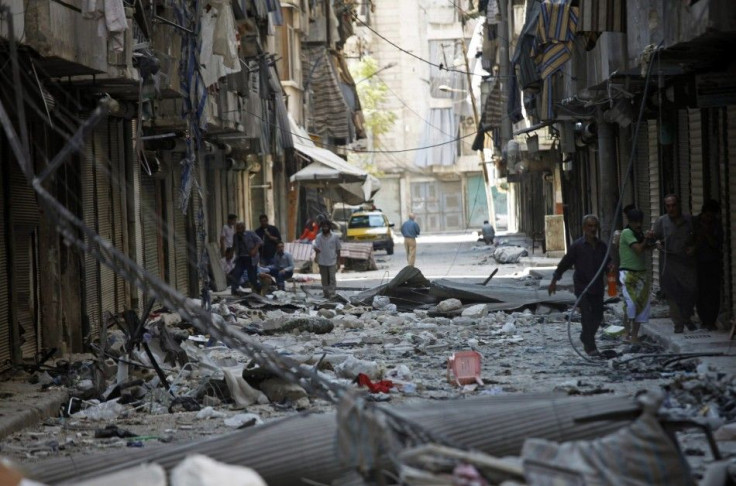Syria: Over 20 Killed In Car Bomb Attacks Near Army Compounds In Aleppo

Two bombs exploded near army compounds in the Syrian city of Aleppo Sunday night, killing more than 20 people and injuring around 60 of President Bashar al-Assad's forces and residents.
The bombing took place near a hospital and a school in the government-controlled sector in the Municipal Stadium district, targeting the improvised barracks and military police headquarters, said residents and opposition activists.
"The army had taken over the neighborhood and emptied it from residents. The hospital was turned into army barracks," activist Ahmad Saeed said.
The Noble Aleppo brigade of the Free Syrian Army, a rebel group of defected Syrian soldiers, accepted responsibility for the attack. The group said the bombs were placed inside the buildings with the help of a loyalist sympathizer, Reuters reported.
A woman residing close to where the bombings happened said that the casualty figure "appeared to be over 100," from the number of ambulances ferrying the wounded and dead from the area, reported Reuters.
Footage of rescue efforts was aired by the state-run TV showing fire trucks attempting to control the blaze and rescue workers digging through mounds of rubble left by the car bomb, the Associated Press reported.
Mohammed Wahid Akkad, the governor of Aleppo province, told a local TV channel that at least two car bombs might have been used in the attack.
The governor lambasted the governments in Turkey and Saudi Arabia for backing opposition forces, the LA Times reported. He said, "They don't have a message, except destruction. They want people to be afraid, to leave Syria. That is their goal, total destruction.... Until when will this terrorism continue?"
Opposition fighters have engaged in a hard battle for more than six weeks now to overthrow Assad's forces and gain control over Aleppo, Syria's financial hub. Assad has used aerial bombardment and artillery to keep the rebels in check. The battle rages on and there seems to be no hope for a decisive victory for either side, as the opposition has inadequate heavy weapons while Assad is averse to sending armed forces of questionable loyalty into the cities to regain the upper hand on ground.
Diplomats following the revolt say Assad's forces are attacking the populated areas to extricate the rebels holed up there. A residential complex in the Hananu area in eastern Aleppo in the rebel-controlled district was decimated in an air raid by government forces Sunday, opposition activists told Reuters over phone. The aerial bombardment also damaged a main water pipeline, leading to a severe water crisis in Aleppo.
A United Nations report estimates that more than 200,000 people have deserted Aleppo, Syria's largest city and commercial mainstay. The residents of the once-flourishing Aleppo are the worst hit as the grueling combat continues.
Meanwhile, U.S. Secretary of State Hillary Clinton said Sunday that though she was working on increasing pressure on Assad during discussions with Russian President Vladimir Putin and Foreign Minister Sergei Lavrov at the summit of the Pacific Rim States in Vladivostok, Russia, over the weekend, she was not very optimistic about whether the lock jam with Russia on the Syrian crisis could be smoothened over before the U.N. General Assembly meets later this month, according to Reuters.
"If we can make progress in New York in the run-up to the U.N. General Assembly, we can certainly try," Clinton told reporters. "But we have to be realistic. We haven't seen eye-to-eye on Syria. That may continue. And if it does continue then we will work with like-minded states to support the Syrian opposition to hasten the day when Assad falls."
China and Russia stand firm on their opposition to the U.S. proposition of "harsh U.N. sanctions to isolate Assad," terming it as interference by the U.S. Moscow is Syria's biggest ally and supplier of arms.
"Our U.S. partners prefer measures like threats, increased pressure and new sanctions against both Syria and Iran. We do not agree with this in principle," Lavrov said, according to Reuters.
Clinton said she would keep up the effort with Lavrov to bring about a formally endorsed agreement brokered by former U.N. Syria envoy Kofi Annan for a transitional governing authority for Syria, reported Reuters.
© Copyright IBTimes 2024. All rights reserved.











